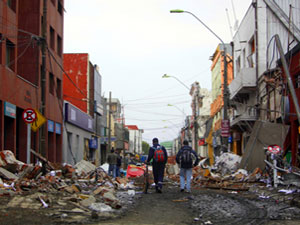Chile's poor will suffer more, says activist
By Daniela Estrada | Last updated: Mar 22, 2010 - 1:28:34 PMWhat's your opinion on this article?

People walk through a damaged neighborhood in Talcahuano, Chile, March 1. Chile's central coast was hit first with an 8.8-magnitude earthquake, then with a tsunami, causing widespread damage. Photo: AP/WideWorldPhotos
|
The latest official figures are 799 people killed at Final Call press time, 500 injured and two million left homeless or otherwise affected.
“The hardest-hit were working-class, poor or middle-class families, which reveals the inequality in the design of public policies, the lack of protection of their rights, and the lack of oversight and regulatory enforcement of basic services on the part of the state,” said Álvaro Ramis, president of Chile's association of non-governmental organizations, Acción, comprised of 70 such groups.
“Hundreds of thousands of Chileans are suffering the accumulated effects of inequality and poverty in this disaster,” said Mr. Ramis, adding that he was “concerned about the state's inadequate capacity to act in situations of social crisis, because despite the ample public funds available, it did not invest them preventively with a view to preparing for this kind of tragedy.”
“The impact of the earthquake is going to have economic and social consequences, obviously, and we are offering the Chilean authorities a detailed evaluation,” the executive secretary of the Economic Commission for Latin America and the Caribbean, Alicia Bárcena, told IPS.
Outgoing socialist President Michelle Bachelet, who handed over to her successor, right-wing President-elect Sebastián Piñera, on March 11, said her government does not yet have a clear estimate of the financial resources needed to deal with the effects of the disaster, but said the reconstruction “will clearly cost a lot of money and will take a long time.”
Although Chile is an international creditor and has a rainy-day fiscal savings fund containing $14.7 billion in windfall copper profits, the former president said international loans “on good terms: would be needed.
The U.S.-based catastrophe modeling firm EQECAT estimated economic damages at up to $30 billion. By comparison, the Inter-American Development Bank calculated that rebuilding in Haiti would amount to around $14 billion.
According to Ms. Bárcena, Chile “has not been knocked out.”
“That's what I would like to get across to the international community. There are regions that have been heavily affected, but this country has institutions, it has a government, it has a strong dynamic economy where the private sector, the armed forces, and we (the UN) are acting,” she added.
“Analyses of all kinds can be made, but this is not the time for analysis, it's time for action. This was an earthquake with an intensity that has never been seen, and we are asking for comprehension,” added President Bachelet. Chile was hit by another earthquake as the new president was being sworn-in.
INSIDE STORIES AND REVIEWS
-
-
About Harriett ... and the Negro Hollywood Road Show
By Rabiah Muhammad, Guest Columnist » Full Story -
Skepticism greets Jay-Z, NFL talk of inspiring change
By Bryan 18X Crawford and Richard B. Muhammad The Final Call Newspaper @TheFinalCall » Full Story -
The painful problem of Black girls and suicide
By Charlene Muhammad -National Correspondent- » Full Story -
Exploitation of Innocence - Report: Perceptions, policies hurting Black girls
By Charlene Muhammad -National Correspondent- » Full Story -
Big Ballin: Big ideas fuel a father’s Big Baller Brand and brash business sense
By Bryan Crawford -Contributing Writer- » Full Story






 Click Here Stay Connected!
Click Here Stay Connected!








